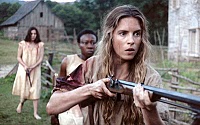| SHADOWS ON THE WALL | REVIEWS | NEWS | FESTIVAL | AWARDS | Q&A | ABOUT | TALKBACK | |||
| The Keeping Room | |||

| |||
|
dir Daniel Barber scr Julia Hart prd Jordan Horowitz, David McFadzean, Dete Meserve, Patrick Newall, Judd Payne with Brit Marling, Hailee Steinfeld, Muna Otaru, Sam Worthington, Kyle Soller, Ned Dennehy, Amy Nuttall, Nicholas Pinnock, Anna-Maria Nabirye, Luminita Filimon, Charles Jarman, Bogdan Farkas release UK Oct.14 lff, US 24.Sep.15 14/UK 1h35  Protecting their home: Steinfeld, Otaru and Marling 


TORONTO FILM FEST  |
R E V I E W B Y R I C H C L I N E | ||
 Set at in the final onslaught of the American Civil War, this offbeat film combines a war movie with a horror thriller as three women make one last stand against encroaching violence. It's an unnerving, haunting film that isn't afraid to take darkly emotional punches without lessening the suspense for a second.
Set at in the final onslaught of the American Civil War, this offbeat film combines a war movie with a horror thriller as three women make one last stand against encroaching violence. It's an unnerving, haunting film that isn't afraid to take darkly emotional punches without lessening the suspense for a second.
Near the end of the Civil War in 1865, society in the Deep South has been eviscerated. Their men left long ago to fight, so sisters Augusta and Louise (Marling and Steinfeld) hold fort with their former slave Mad (Otaru), arming and locking themselves in an upstairs bedroom at night as protection against ex-soldiers who have nothing to lose. Then two of these men, Moses and Henry (Worthington and Soller), arrive on their farm, and no one wants to take a moment to talk about what might happen. This is a battle for survival. Essentially a pre-Western, the film opens with an act of hideous barbarism that establishes the setting as a place of rampant lawlessness. The minimalistic screenplay builds menace simply by revealing the general anarchy of the time and place: no one is safe, race is irrelevant, the law doesn't exist. This adds tension to every scene. A bar encounter (featuring Dennehy and Nuttall) is almost unbearably suspenseful, as is the story's entire final act. All of this is eerily low-key, which lets the actors subtlety reveal their off-the-cuff characters. Steinfeld is solid as a stubbornly rebellious teen who has nightmares about her father and brother on the battlefield. Marling is also excellent as a desperate survivor, while Otaru gets the most astonishing dramatic moments in the film, offering insight into her hideous past and dignity in the face of new tragedy. By contrast, Worthington and Stoller are rivetingly, illogically violent, as if all that's left of them is the ability to rape and murder. Yes, these are people reduced to a primal state, so it feels like the end of the world. And if all the men have died at war, Augusta can no longer see a future with a husband and family of her own. Director Barber captures the overwhelming pointlessness almost too adeptly ("Things could have been different," says Moses. "But they ain't," replies Augusta). And as events escalate, the film kind of shifts into a straightforward horror movie: each face-off is grim, harsh and bloody, right to the stunning final shot.
| |||
| R E A D E R R E V I E W S | |||

 Still waiting for your comments ... don't be shy.
Still waiting for your comments ... don't be shy.
| |||
|
© 2015 by Rich Cline, Shadows on the Wall HOME | REVIEWS | NEWS | FESTIVAL | AWARDS | Q&A | ABOUT | TALKBACK | |||
